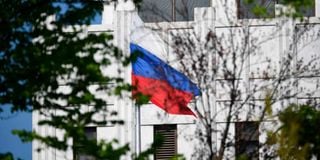US imposes sanctions on Moscow, expels 10 diplomats

The Russian flag flies at the embassy's compound in Washington, DC, on April 15, 2021. The US announced sanctions against Russia on April 15, 2021, and the expulsion of 10 diplomats in retaliation for what Washington says is the Kremlin's US election interference, a massive cyber attack and other hostile activity.
Washington,
The United States announced sanctions and the expulsion of 10 Russian diplomats Thursday in retaliation for what Washington says is the Kremlin's US election interference, a massive cyber-attack and other hostile activity.
President Joe Biden's broadside against Russia came the same week as he offered to meet President Vladimir Putin for their first summit -- a meeting US officials say remains "vital" so that the two countries can deescalate.
In an executive order, Biden widened restrictions on US banks trading in Russian government debt, expelled 10 diplomats who include alleged spies, and sanctioned 32 individuals accused of meddling in the 2020 presidential election.
Biden's order "sends a signal that the United States will impose costs in a strategic and economically impactful manner on Russia if it continues or escalates its destabilizing international action," the White House said in a statement.
The Kremlin said Thursday that sanctions would not "help" momentum for a summit and once the White House unveiled its measures, the Russian foreign ministry warned a Russian response was "inevitable."
"The United States is not ready to come to terms with the objective reality that there is a multipolar world that excludes American hegemony," spokeswoman Maria Zakharova said.
The latest tension comes against a backdrop of longterm anger in Washington at Russian election meddling and worries both in the United States and its European allies over Russia's recent troop build up on the border of Ukraine.
The almost fatal poisoning and ongoing imprisonment of Alexei Navalny, who is effectively the last open political opponent to Putin, has further spiked concerns in the West.
A senior US official, who spoke on condition of anonymity, told reporters that Washington was ready to impose more measures if necessary and also that additional actions are already in place but "will remain unseen."
Despite this, the official stressed that Washington is seeking deescalation and wants the proposed Biden-Putin summit to go ahead.
Democratic institutions
"We do not desire a downward spiral," the official said. "In the coming months it will be vital for the two leaders to sit down to discuss the full range of issues facing our relationship."
The White House statement listed in first place Moscow's "efforts to undermine the conduct of free and fair democratic elections and democratic institutions in the United States and its allies and partners."
This referred to allegations that Russian intelligence agencies mounted persistent disinformation and dirty tricks campaigns during the 2016 and 2020 presidential elections, in part to help Donald Trump's candidacies.
The White House said the sanctions likewise respond to "malicious cyber activities against the United States and its allies and partners," referring to the massive so-called SolarWinds hack of US government computer systems last year.
US national security
The statement also called out Russia's "targeting" of dissidents and journalists on foreign soil and undermining of security in countries important to US national security.
In addition, the Department of Treasury, together with the European Union, Australia, Britain and Canada, sanctioned eight individuals and entities associated with Russia's occupation of Crimea in Ukraine.
US allies responded with a carefully choreographed show of support.
In Brussels, the NATO military alliance said US allies "support and stand in solidarity with the United States, following its 15 April announcement of actions to respond to Russia's destabilizing activities."
NATO members cited a "sustained pattern" of Russian hostility.
"We call on Russia to cease immediately its destabilizing behavior, and to uphold its international obligations," they said.
The European Union issued a statement expressing "solidarity with the United States on the impact of malicious cyber activities, notably the SolarWinds cyber operation."





